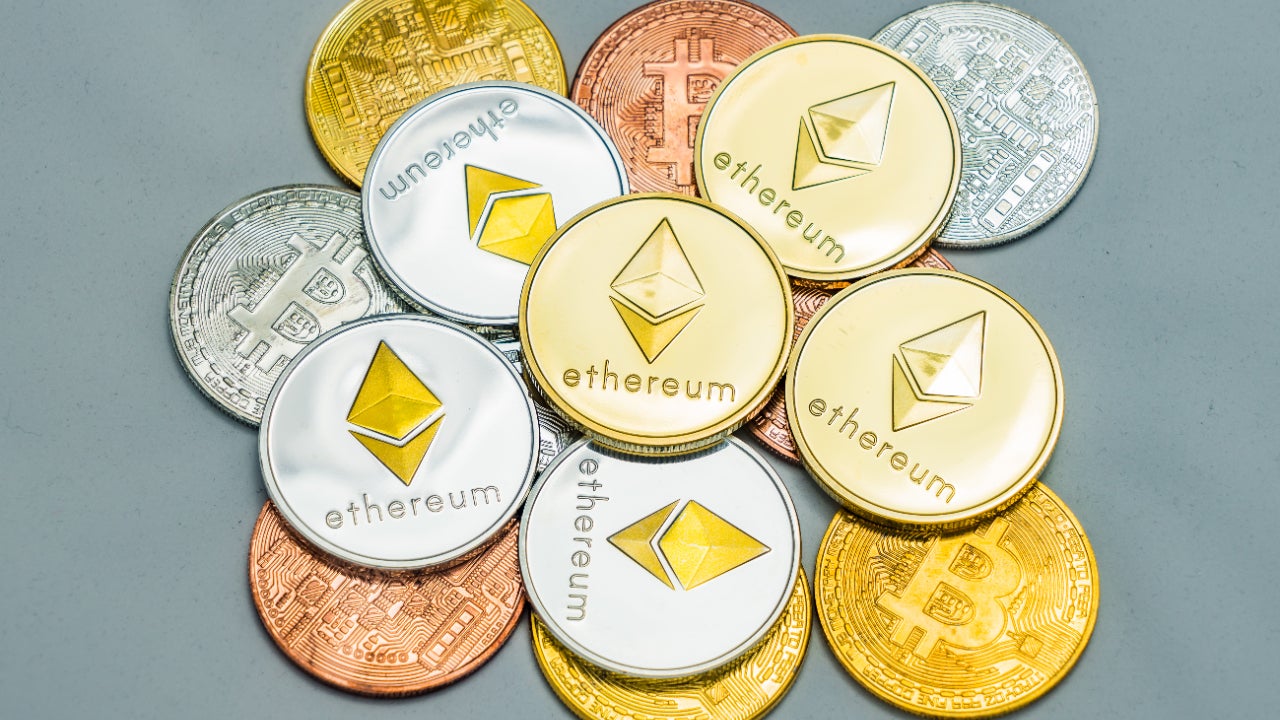Introduction
Welcome to the world of digital currency, a dynamic and evolving field that has the potential to revolutionize the way we transact and store value. In recent years, digital currency has gained significant popularity and attention, transforming traditional financial systems and creating new avenues for financial transactions.
But what exactly is digital currency? Unlike physical money, digital currency is intangible and exists solely in electronic form. It is based on cryptographic principles, utilizing advanced encryption techniques to secure transactions and control the creation of new units.
Digital currency can be decentralized, meaning it operates without the need for intermediaries such as banks or governments, or it can be centralized, where a governing entity or organization has control over its issuance and regulation.
This article will delve into the world of digital currency, exploring its various types, how it works, its advantages and challenges, popular digital currencies, and even the future of this exciting financial landscape.
What Is Digital Currency?
Digital currency, also known as cryptocurrency, is a form of digital or virtual money that utilizes cryptographic encryption to secure and verify transactions. It operates independently of traditional banking systems and is not issued or regulated by any central authority such as a government or financial institution.
One of the defining features of digital currency is decentralization. Unlike traditional currencies, which are controlled by central banks, digital currencies are built on decentralized networks called blockchain. This means that transactions are recorded on a public ledger maintained by a network of computers, ensuring transparency and security.
Digital currencies are designed to be secure and anonymous, providing a level of privacy that is often lacking in traditional banking systems. Instead of using personal information like names and addresses, digital currencies use unique cryptographic keys to verify and complete transactions.
Another important aspect of digital currency is its limited supply. Many digital currencies, such as Bitcoin, have a predetermined maximum supply, which means that no additional units can be created beyond the set limit. This scarcity adds value to the currency and makes it an attractive investment option.
Transactions with digital currencies are typically conducted through digital wallets, which are software applications that allow users to send, receive, and store their digital assets. These wallets are secured by private keys, which are long strings of cryptographic codes that ensure the safety and integrity of the user’s funds.
Overall, digital currency is a revolutionary form of money that offers a decentralized, secure, and efficient alternative to traditional financial systems. Its adoption and acceptance continue to grow, with more businesses and individuals recognizing its potential in facilitating global transactions and providing financial freedom.
Types of Digital Currency
There are various types of digital currencies available in the market, each with its own unique features and purpose. Let’s explore some of the most popular ones:
- Bitcoin (BTC): Bitcoin is the first and most well-known digital currency. It was created in 2009 by an anonymous person or group of people using the pseudonym Satoshi Nakamoto. Bitcoin operates on a decentralized network and has a limited supply of 21 million coins.
- Ethereum (ETH): Ethereum is a decentralized, open-source platform that enables the creation of smart contracts and decentralized applications (DApps). The native cryptocurrency of Ethereum is called Ether, and it is used to facilitate transactions and power the network.
- Ripple (XRP): Ripple is both a digital payment protocol and a digital currency. It aims to facilitate fast and low-cost international money transfers. Ripple is unique in that it works with traditional financial institutions and banks to improve the efficiency of cross-border transactions.
- Litecoin (LTC): Created by Charlie Lee in 2011, Litecoin is often referred to as the “silver” to Bitcoin’s “gold.” It offers faster transaction confirmation times and a different hashing algorithm, making it a viable alternative for everyday transactions.
- Bitcoin Cash (BCH): Bitcoin Cash is a digital currency that was created as a result of a hard fork from the original Bitcoin in 2017. It aims to improve scalability and transaction speed by increasing the block size limit, allowing for more transactions to be processed.
- Monero (XMR): Monero is a privacy-focused cryptocurrency that prioritizes anonymity and untraceability. It uses advanced cryptographic techniques to obfuscate transaction details and protect the privacy of its users.
These are just a few examples of the wide range of digital currencies available. Each digital currency has its own unique set of features, use cases, and level of adoption. It’s important to conduct thorough research and understand the characteristics of each digital currency before engaging in transactions or investments.
How Does Digital Currency Work?
Understanding how digital currency works is essential to grasp its revolutionary potential. At the core of digital currency is blockchain technology, which serves as a decentralized ledger to record all transactions in a transparent and secure manner.
When a digital currency transaction takes place, it is first verified by network participants known as miners. Miners use powerful computers to solve complex mathematical problems, which helps validate and secure the transaction. Once the transaction is verified, it is added to a block, along with other transactions, and added to the blockchain.
The blockchain serves as a public ledger that is continuously updated and maintained by participants in the network. This ensures transparency and prevents the possibility of double-spending, where the same digital currency is used for multiple transactions.
In addition to the blockchain, digital currency relies on cryptography to secure transactions and control the creation of new units. Advanced cryptographic techniques, such as public-key cryptography, are used to generate digital signatures that verify the authenticity of transactions. These digital signatures also ensure that only the rightful owner of the digital currency can initiate a transaction.
Digital currency can be stored in digital wallets, which are software applications that allow users to manage and access their digital assets. Digital wallets can be web-based, mobile-based, or hardware-based. They contain the private keys needed to access and transfer the digital currency, adding an extra layer of security.
Transactions with digital currency are typically peer-to-peer, meaning they occur directly between two parties without the need for intermediaries such as banks. This enables fast and low-cost transactions, especially for cross-border payments that would typically involve lengthy processing times and high fees with traditional banking systems.
Overall, the workings of digital currency rely on blockchain technology, cryptography, and decentralized networks. It offers a secure, transparent, and efficient way to transact and store value, eliminating the need for intermediaries and increasing financial inclusivity.
The Advantages of Digital Currency
Digital currency presents several advantages that have contributed to its growing popularity and adoption. Here are some of the key advantages:
- Decentralization: One of the primary advantages of digital currency is its decentralized nature. It operates on a peer-to-peer network, removing the need for intermediaries such as banks. This decentralization empowers individuals to have greater control over their finances and eliminates the risk of government or financial institutions manipulating the currency or imposing restrictions.
- Security: Digital currency transactions are secured using advanced cryptographic techniques. This ensures that transactions are authenticated, preventing fraud and unauthorized access. Additionally, since digital currencies are stored on a blockchain, which is a distributed ledger, it becomes extremely difficult to tamper with or alter the transaction history, adding an extra layer of security.
- Global Accessibility: Digital currencies operate on a global scale. They can be accessed and transacted with anywhere, provided you have an internet connection. This enables individuals in underbanked or developing regions to access financial services and participate in the global economy, fostering financial inclusion.
- Efficiency and Speed: Digital currency transactions can be processed quickly, especially when compared to traditional banking systems that may involve intermediaries and manual processes. Transactions can occur almost instantly, enabling fast settlement times, especially for cross-border transactions.
- Lower Transaction Costs: Digital currency transactions often come with lower fees compared to traditional financial systems. This is particularly beneficial for international transactions, where traditional methods can incur significant fees for conversions and wire transfers. With digital currency, the transaction fees are typically minimal, making it a cost-effective option.
- Financial Freedom: Digital currency provides individuals with greater financial freedom and control over their wealth. Users have sole ownership of their digital currency and can transact directly without the need for a third party. This eliminates the need for traditional banking systems, which may have limitations and restrictions on accessing or using funds.
These advantages of digital currency have contributed to its increasing acceptance and use across various sectors. However, it’s important to note that digital currency also presents unique challenges that need to be addressed to ensure its widespread adoption and usability.
The Challenges of Digital Currency
While digital currency offers several advantages, it also faces certain challenges that need to be addressed for its widespread adoption. Here are some of the key challenges:
- Volatility: Digital currency markets can be highly volatile, with prices experiencing significant fluctuations in short periods. This volatility poses risks for investors and businesses that may be hesitant to accept or hold digital currencies due to uncertainty in their value.
- Regulation: The regulatory landscape surrounding digital currencies remains complex and varies across different jurisdictions. Governments are still grappling with how to classify and regulate digital currencies, which can create uncertainty and hinder mainstream adoption. Clear and balanced regulations are needed to foster trust and protect users while encouraging innovation and growth.
- Scalability: As digital currencies gain popularity, scalability becomes a challenge. Traditional payment systems can handle high volumes of transactions, but decentralized blockchains may struggle to keep up with increasing demands. Ongoing research and development efforts are needed to address scalability issues and ensure that digital currencies can support mass adoption.
- Security Concerns: While digital currencies are secured by advanced cryptographic techniques, there are still security concerns. Hackers target exchanges, wallets, and platforms, seeking to exploit vulnerabilities and steal digital assets. It is crucial to enhance security measures and user awareness to protect against cyber threats.
- Energy Consumption: The mining process used to validate transactions and secure the blockchain requires substantial computational power, resulting in high energy consumption. This has raised concerns about the environmental impact of digital currencies. Exploring and implementing more energy-efficient consensus mechanisms is essential to reduce the carbon footprint of digital currency operations.
- Education and Awareness: Digital currency is still relatively new and complex for many individuals and businesses. Raising awareness and providing educational resources is crucial to ensure that users understand the potential benefits, risks, and best practices associated with using and investing in digital currencies.
Addressing these challenges is essential for the continued growth and adoption of digital currencies. Collaborative efforts between industry participants, governments, and regulatory bodies are necessary to build a robust and sustainable digital currency ecosystem that offers stability, security, and usability.
Popular Digital Currencies
The digital currency landscape is constantly evolving, with new cryptocurrencies emerging regularly. Here, we explore some of the most popular and well-known digital currencies:
- Bitcoin (BTC): Bitcoin is the first and most recognized digital currency. Created in 2009, it operates on a decentralized network and has gained widespread acceptance. Bitcoin’s decentralized nature and limited supply of 21 million coins have attributed to its popularity and value.
- Ethereum (ETH): Ethereum is not only a digital currency but also a blockchain-based platform that enables the creation of smart contracts and decentralized applications (DApps). Ether (ETH) is the native cryptocurrency of the Ethereum platform and is used for transactions and powering the network.
- Ripple (XRP): Ripple is a digital payment protocol designed for fast and cost-effective international money transfers. Ripple’s native currency, XRP, is used to facilitate transactions and liquidity between different currencies, acting as a bridge currency.
- Litecoin (LTC): Introduced in 2011, Litecoin is often referred to as “silver” to Bitcoin’s “gold.” It offers faster transaction confirmation times and uses a different hashing algorithm, making it more suitable for everyday transactions. Litecoin has gained popularity for its efficiency and lower transaction fees.
- Bitcoin Cash (BCH): Bitcoin Cash is a digital currency that emerged from a hard fork of Bitcoin in 2017. Its main goal is to improve scalability and transaction speed. Bitcoin Cash increases the block size limit, allowing for more transactions to be processed in each block.
- Cardano (ADA): Cardano is a blockchain platform that aims to provide a more secure and scalable infrastructure for the development of decentralized applications. Its native cryptocurrency, ADA, is used for peer-to-peer transactions within the Cardano ecosystem.
- Stellar (XLM): Stellar is a blockchain-based platform designed to facilitate fast and low-cost cross-border transactions. It aims to bridge the gap between traditional financial systems and digital currencies, making it easier for individuals and businesses to transfer funds globally.
- Polkadot (DOT): Polkadot is a multi-chain framework that allows different blockchains to interoperate and share information. Its native cryptocurrency, DOT, is used for governance, bonding, and staking on the Polkadot network.
- Cardano (ADA): Cardano is a blockchain platform that aims to provide a more secure and scalable infrastructure for the development of decentralized applications. Its native cryptocurrency, ADA, is used for peer-to-peer transactions within the Cardano ecosystem.
- Stellar (XLM): Stellar is a blockchain-based platform designed to facilitate fast and low-cost cross-border transactions. It aims to bridge the gap between traditional financial systems and digital currencies, making it easier for individuals and businesses to transfer funds globally.
- Polkadot (DOT): Polkadot is a multi-chain framework that allows different blockchains to interoperate and share information. Its native cryptocurrency, DOT, is used for governance, bonding, and staking on the Polkadot network.
These are just a few examples of the popular digital currencies in the market. Each digital currency has its own unique features, use cases, and level of adoption. It’s essential to conduct comprehensive research and consider factors such as technology, team, and market demand before engaging in transactions or investments.
Investing in Digital Currency
Investing in digital currency has gained significant attention as the market continues to grow and evolve. Here are some considerations and steps to help you navigate the process of investing in digital currency:
- Educate Yourself: Before investing, it’s crucial to educate yourself about digital currency and understand its underlying technology, market trends, and potential risks. Stay updated with news and developments in the digital currency space to make informed investment decisions.
- Set Investment Goals: Determine your investment goals, whether it’s long-term wealth accumulation, portfolio diversification, or short-term trading gains. Defining clear goals will help shape your investment strategy and risk tolerance.
- Choose a Reliable Exchange: Select a reputable and secure digital currency exchange to buy and trade cryptocurrencies. Ensure that the exchange has a user-friendly interface, good liquidity, and robust security measures to protect your assets.
- Perform Due Diligence: Before investing in a specific digital currency, conduct thorough research on the project, team, technology, and market potential. Evaluate the coin’s fundamentals, community support, and long-term viability to make informed investment decisions.
- Manage Risk and Diversify: It’s important to manage risk by diversifying your digital currency investments across different coins or projects. Diversification helps mitigate the impact of potential losses, as different currencies may have varying levels of volatility and growth potential.
- Implement Risk Management Strategies: Consider setting stop-loss orders to limit potential losses by automatically selling if a certain price threshold is reached. Additionally, stay updated with market trends and consider using technical analysis tools to make informed entry and exit decisions.
- Security Measures: Protect your digital currency investments by practicing good security measures. Use hardware wallets or secure software wallets to store your coins offline. Enable two-factor authentication on your exchange and wallet accounts, and be cautious of phishing attempts and fraudulent schemes.
- Track and Monitor Your Investments: Regularly track and monitor the performance of your digital currency investments. Stay updated with industry news, market trends, and regulatory developments that may impact your investment strategy.
- Consult with Professionals: If you’re new to digital currency investing or unsure about certain aspects, consider seeking advice from financial professionals or joining online communities where experienced investors share insights and strategies.
Remember, investing in digital currency, like any investment, involves risks. Prices can be volatile, and market conditions can change rapidly. It’s advisable to only invest what you can afford to lose and to do thorough research before making any investment decisions.
The Future of Digital Currency
The future of digital currency holds immense potential for transforming the way we transact, store value, and interact with financial systems. Here are some key trends and possibilities that point towards a promising future:
- Mainstream Adoption: As digital currencies gain more recognition and acceptance, we can expect increased adoption by individuals, businesses, and even governments. The integration of digital currencies into existing financial systems may lead to greater efficiency, reduced costs, and increased financial inclusion.
- Central Bank Digital Currencies (CBDCs): Several central banks worldwide are exploring the development of their own digital currencies, known as central bank digital currencies (CBDCs). CBDCs would operate as digital representations of fiat currencies, providing the advantages of digital currencies while maintaining the stability and trust associated with government-backed money.
- Improved Scalability and Efficiency: Blockchain technology continues to evolve, with ongoing research and development efforts focused on enhancing scalability and improving transaction speeds. Solutions like sharding, layer-two protocols, and interoperability frameworks hold the potential to address scalability challenges and offer faster, more efficient digital currency transactions.
- Enhanced Regulatory Frameworks: As digital currencies become more mainstream, regulators are likely to establish clearer and more comprehensive frameworks to govern their use and protect consumers. These regulations will aim to strike a balance between fostering innovation and mitigating risks such as money laundering and fraud.
- Integration with Emerging Technologies: Digital currency is expected to integrate with emerging technologies like artificial intelligence (AI), internet of things (IoT), and decentralized finance (DeFi). This integration can lead to new use cases and innovative financial products, such as smart contracts, decentralized lending, and automated financial management.
- Increased Financial Inclusion: Digital currency has the potential to provide financial services to the unbanked and underbanked populations worldwide. With access to a mobile phone and an internet connection, individuals in remote areas can transact, store value, and access financial services, bypassing the need for traditional banks.
- Advancements in Privacy: Privacy-focused digital currencies and privacy-enhancing technologies are being developed to provide users with more control over their personal data. These advancements aim to address concerns regarding data privacy and create more secure and anonymous transactions.
- International Remittances: Digital currencies can significantly impact the remittance market by reducing the cost, time, and complexity of international money transfers. With digital currencies, individuals can easily send and receive funds across borders, bypassing traditional intermediaries and reducing fees.
The future of digital currency is dynamic and holds great promise for disrupting traditional financial systems, supporting financial inclusion, and enabling new possibilities for individuals and businesses. As technology continues to advance and regulatory frameworks evolve, digital currencies are likely to play an increasingly significant role in the global economy.
Conclusion
Digital currency has emerged as a transformative force in the global financial landscape. Its decentralized nature, enhanced security measures, and potential for financial inclusivity make it a compelling alternative to traditional banking systems. As the digital currency market continues to grow and evolve, it is crucial to recognize the advantages and challenges associated with this emerging technology.
Advantages such as decentralization, security, global accessibility, efficiency, lower transaction costs, and financial freedom demonstrate the potential of digital currency to revolutionize the way we transact and store value. The diverse types of digital currencies available, including Bitcoin, Ethereum, Ripple, Litecoin, and many more, offer unique features and use cases tailored to specific needs.
However, digital currency also faces challenges such as volatility, regulation, scalability, security concerns, energy consumption, and the need for increased education and awareness. Overcoming these challenges will pave the way for wider acceptance and adoption of digital currencies in the future.
The future of digital currency is promising, with trends such as mainstream adoption, the development of central bank digital currencies (CBDCs), improved scalability, enhanced regulatory frameworks, integration with emerging technologies, increased financial inclusion, advancements in privacy, and the transformation of international remittances. These developments signal a shifting paradigm in finance and a more accessible, efficient, and inclusive global financial system.
As digital currency continues to evolve, it is important for individuals and businesses to stay informed and educated about the opportunities and risks associated with this rapidly changing landscape. Investing in digital currency requires careful consideration, research, and risk management strategies.
Ultimately, the future of digital currency holds immense potential to reshape the way we transact, store value, and participate in the global economy. With ongoing advancements, collaborative efforts, and regulatory support, digital currency has the power to empower individuals, drive financial innovation, and create a more inclusive and efficient financial system.

























